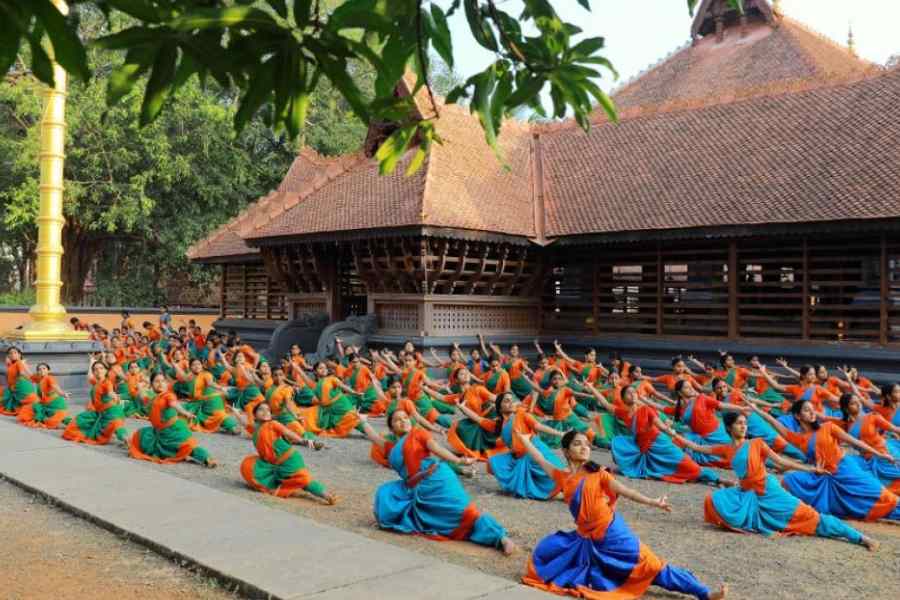The Kerala Kalamandalam, the gold standard when it comes to learning the state's performing art forms like Kathakali, has broken with tradition and served non-vegetarian food to its hundreds of students in deference to popular demand.
It’s perhaps a coincidence that the 94-year-old institution sourced its chicken biryani from the nearby central prison that sells Kerala delicacies under its Food for Freedom project, run by the inmates.
"It was a long-pending demand to serve non-vegetarian food in our mess," the registrar of the institution, P. Rajeshkumar, told The Telegraph on Friday.
"Since the students were anyway ordering non-vegetarian food through delivery apps from their hostel, we realised it would be only appropriate, and in keeping with the times, to serve non-vegetarian food in the mess."
Rajeshkumar said the "vegetarian-only idea" owed to "a longstanding tradition and not a rule".
"We cannot restrict our students — or anyone, for that matter — from eating what they want. Otherwise, what’s the point in calling ourselves progressive?" he said.
Over 450 of the 480 students currently enrolled in the institution were demanding non-vegetarian food, Rajeshkumar said. Most faculty members have welcomed the idea, although some traditionalists did express reservations, he added.
The Kalamandalam offers undergraduate, postgraduate and doctoral programmes in 14 disciplines relating to various forms of performing arts such as Mohiniyattam, Kathakali, Thullal, Koodiyattam, Kathakali music and makeup, and Carnatic classical music as well as percussion instruments such as the chenda and the maddalam.
"We plan to serve non-vegetarian food twice or thrice a month to begin with since we have to source them from outside — our kitchen needs an upgrade to handle the demand," Rajeshkumar said.
"We will begin serving non-vegetarian food cooked within the campus once the kitchen is revamped and we can start a waste management plant to process the meat waste."
Sreelakshmi Pradeep, vice-president of the Kerala Kalamandalam students’ union, told this newspaper that the chicken biryani was sourced from the central prison because of the easy availability.
"We ordered the biryani from the prison with the help of the management. We then picked it up and served it to students," she said.
The institution is likely to continue to buy non-vegetarian food from the central prison until the campus kitchen is upgraded.
Sreelakshmi said the vegetarian students need not worry: "Those who want to stick to tradition and have vegetarian food are free to do so since our kitchen is already catering vegetarian food."
Normally, the students are served the traditional Kerala kanji (rice gruel) laced with ghee and boiled green gram for breakfast. Vegetarian meals are served for lunch and dinner.
A handful of teachers did object to the change in menu, arguing a vegetarian diet is key to the success of the ayurvedic massage therapies that the students undergo to keep their bodies flexible for the rigorous training routines.
But Sreelakshmi, a student of Mohiniyattam, countered that most of the students anyway ate non-vegetarian food once they left the campus. “There is absolutely no basis to such an argument,” she said.
A management official who declined to be named ridiculed the vegetarian-only theory.
“I can’t digest ghee, which is considered a vegetarian fat. There is no scientific basis to claiming that non-vegetarian food would make one’s body stiff or unfit for classical dances,” he said.
The Kalamandalam had in 2021 made a significant departure from tradition by allowing girls to join the Kathakali courses, until then the preserve of boys.
It shattered another barrier by allowing a 14-year-old hijab-wearing Muslim girl, Sabri N, to join the Kathakali course in June last year.
In February this year, the institution announced menstrual leave for its students in line with the state government’s gender justice policy.











